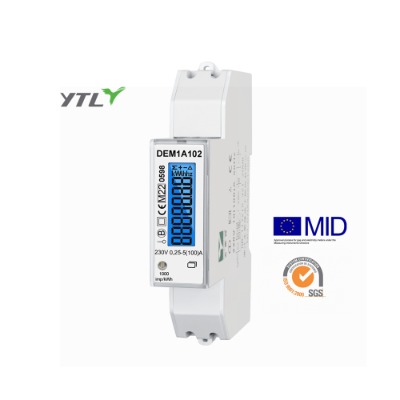 A tariff kWh meter is a device that measures the amount of electrical energy consumed in a household or business. It is an essential tool for utility companies, helping them to accurately bill their customers for the energy they use.
A tariff kWh meter is a device that measures the amount of electrical energy consumed in a household or business. It is an essential tool for utility companies, helping them to accurately bill their customers for the energy they use.
The term "tariff" refers to the rate at which an electric utility company charges for electricity. This rate can vary depending on the time of day, season, and type of customer. For example, residential customers may be charged at a different rate than commercial or industrial customers. The kilowatt-hour (kWh) meter is designed to measure the amount of energy consumed during each period and calculate the cost based on the applicable tariff.
There are several types of kWh meters available, but the common ones are digital and electro-mechanical. Digital meters use microprocessors and software algorithms to measure and record energy usage. They can provide detailed data on energy consumption to both the utility company and the customer. On the other hand, electro-mechanical meters use mechanical parts such as gears and dials to measure energy consumption. These meters are simpler in design and less expensive than digital meters, but they do not provide as much information on energy usage.
The installation of a tariff kWh meter is typically the responsibility of the utility company, and it is mandatory for all customers to have one installed. The meter is usually located near the service entrance of the building or home and is wired directly into the electrical circuit. The utility company is responsible for reading the meter and billing the customer accordingly. In addition to measuring energy consumption, tariff kWh meters can also be used to monitor power quality and detect abnormalities in the electrical system. For example, a sudden surge in energy usage could indicate a malfunctioning appliance or equipment. By detecting these abnormalities, the utility company can take action to prevent damage to the electrical system and ensure that all customers are billed accurately.
In addition to measuring energy consumption, tariff kWh meters can also be used to monitor power quality and detect abnormalities in the electrical system. For example, a sudden surge in energy usage could indicate a malfunctioning appliance or equipment. By detecting these abnormalities, the utility company can take action to prevent damage to the electrical system and ensure that all customers are billed accurately.
The tariffs for kilowatt-hours (kWh) meters play a crucial role in the functioning of the electrical grid and the energy market. They allow utility companies to accurately bill their customers for the energy they use, and encourage energy conservation by charging higher tariffs during peak periods. Additionally, the data collected by these meters can be used to improve the efficiency and reliability of the electrical grid.
In conclusion, a tariff kWh meter is an essential device for measuring energy consumption in households and businesses. It allows utility companies to accurately bill their customers for the energy they use and plays a crucial role in the functioning of the electrical grid. Understanding the purpose and operation of these meters is important for all energy consumers.
Knowledge
What Is a Tariff kWh Meter?

YTL is a professional supplier of energy meter and AMI solution. the Top 100-enterprise with most investment value in Zhejiang. And“Yongtailong”is the famous brand of Zhejiang. With nearly 20 years' experience in energy metering, we devote ourselves to providing competitive projects and creating value for customers.
● Online + Offline. Provide cost-effectiv solutions
● Strict quality control mechanism.High quality assurance
● Five R&D centers,combine with hardware&software design, experiment and testing
● Global service capability, provide customers timely and effective solution
● Good customer feedback. Reliable after-sales service
● Online + Offline. Provide cost-effectiv solutions
● Strict quality control mechanism.High quality assurance
● Five R&D centers,combine with hardware&software design, experiment and testing
● Global service capability, provide customers timely and effective solution
● Good customer feedback. Reliable after-sales service
-
- ABOUT YTL
- About YTL
- Factory
- Honor
- Development
- Privacy
-
- YTL culture
- Culture
- Values
- Advantage
- Three Phase kWh Meter
-
- products
- Single Phase Din Rail Meter
- Three Phase Smart APS Electric Energy Meters
- Three Phase Multi Function Electronic Energy Meter
- Digital Electric Meters
- Electronic Energy Meter
- Electronic Energy Meters
- Three Phase Keypad split type Energy Meter
- Single Phase IC Card Prepayment Energy Meters
- Three Phase Anti-tamper Suspension Energy Meters
-
- Information Activity
- Exhibition News
- Blog
- Staff Activity
- Single Phase Smart Watt Hour Meter
COPYRIGHT © 2020 Zhejiang Yongtailong Electronic Co., Ltd. ALL RIGHTS RESERVED .  China Electronic Energy Meters Manufacturers
China Electronic Energy Meters Manufacturers

 English
English 中文简体
中文简体


.jpg?imageView2/2/w/500/h/500/format/png/q/100)



-1.jpg?imageView2/2/w/500/h/500/format/png/q/100)
.jpg?imageView2/2/w/500/h/500/format/png/q/100)




